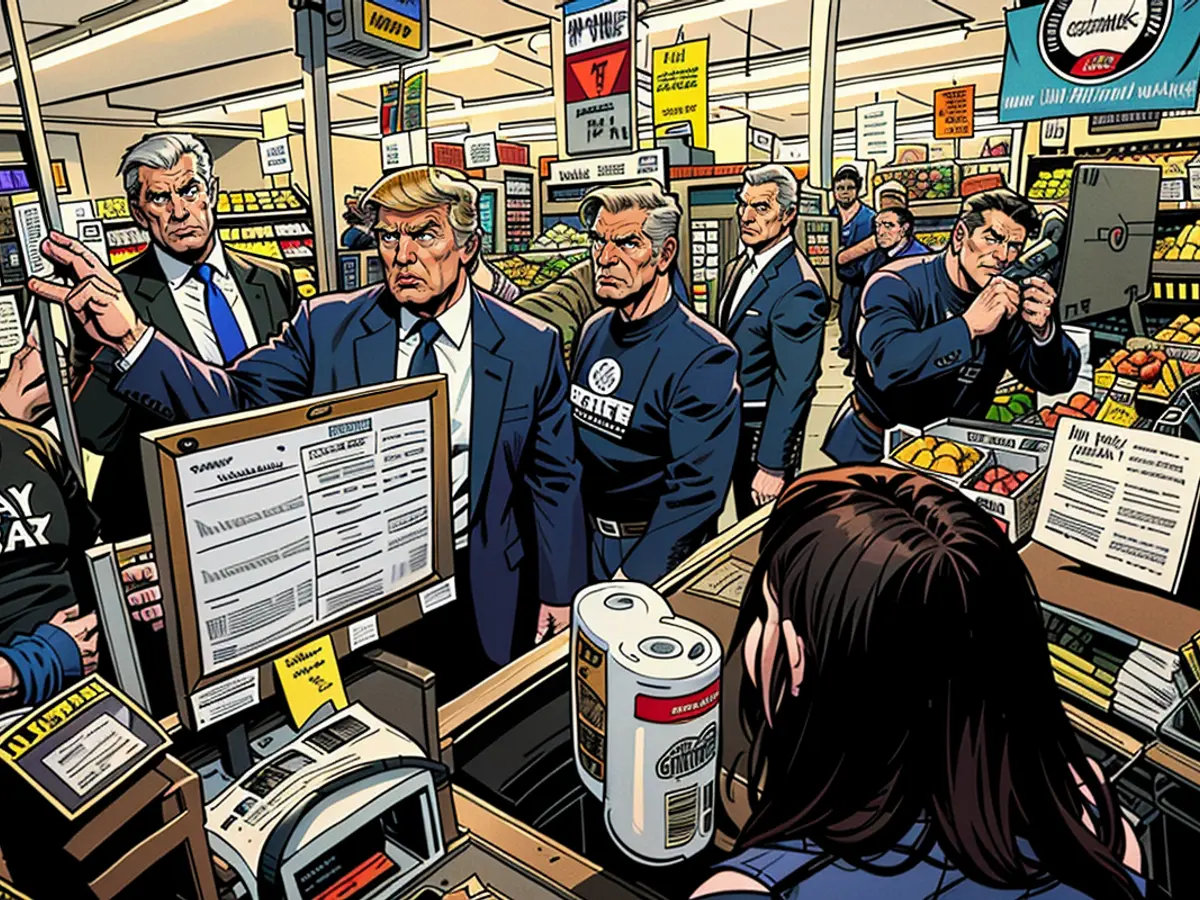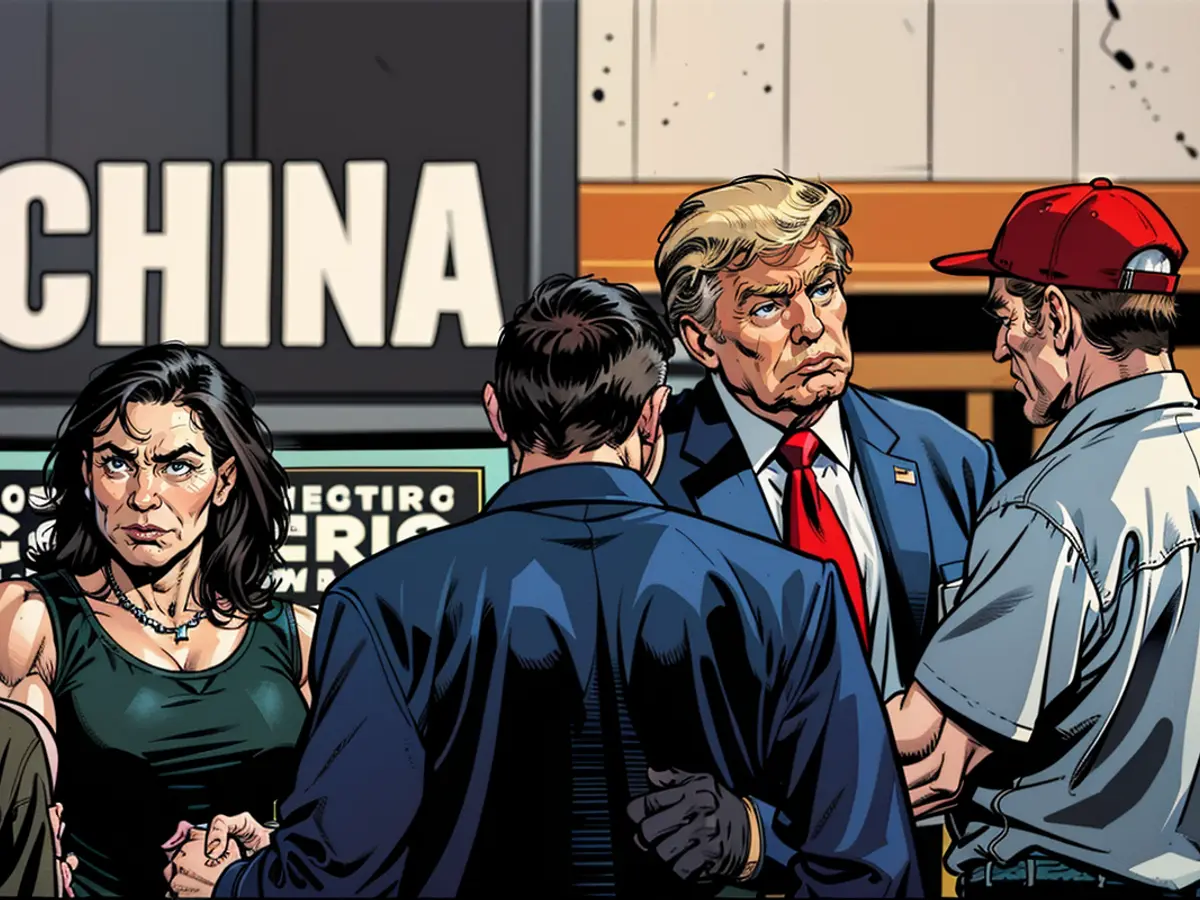Trump leverages economic apprehensions as a tactic – with apparent success
In a gathering on Monday, former President Trump expressed his resolve to shield rural Americans from what he perceives as the predatory power of China. He also showcased his ability to orchestrate persuasive economic arguments, a trait that has contributed to his leading position in polls concerning the foremost election issue.
Trump's remarks about an impending agricultural sector bankruptcy resonated with his familiar pessimistic political stance. This refrain forms the bedrock of his political belief and has proven adaptable for various audiences. He often paints a picture of a nation battling crime, economic deterioration, and an alleged immigrant influx.
Politicians typically rally support by presenting an optimistic vision, offering hope and assurances of change. The Democratic nominee Kamala Harris is attempting to eradicate Trump's grim portrayal of a nation in turmoil by stressing joy and the potential for a new "opportunity economy."
However, Trump predominantly disseminates fear and threats. For instance, during his debate with Harris, he warned the public of impending World War III. In a more recent Fox News Town Hall, he warned of an impending depression if Harris were to assume the presidency, likening it to 1929. He labels Harris as a "communist" and "Comrade," implying that in the event of his defeat, the United States would cease to be an economically viable nation.
Trump also appears to be seeking culprits if he were to lose the upcoming election in under 40 days.
Last week, at an event focused on antisemitism, the former president cautioned that "the Jewish people" would share responsibility for his potential loss in November. He implied, much as in the past, that Jews should avoid supporting Democrats as they might jeopardize Israel's survival due to their perceived lack of support for the far-right Prime Minister Benjamin Netanyahu. The comments marked another instance of the invocation of an antisemitic trope, implying that American Jews possess dual loyalties. The Biden administration, however, has urged Netanyahu to protect Palestinian civilians and has diverted substantial resources to safeguard Israel, particularly during the international effort to repel the substantial Iranian missile assault in April.
Taking aim at another religious group, the former president released a statement on social media, urging Catholic voters to reconsider their support for Harris, alleging that "Catholics are literally being persecuted by this administration."
Over the weekend, the ex-president posted a peculiar, patriarchal message on Truth Social, effectively emulating a dictatorial state's decree as he asserted, "WOMEN WILL BE HAPPY, HEALTHY, CONFIDENT AND FREE" if he returns to power as president.
At a rally in Pennsylvania on Monday night, Trump, who has been held responsible for sexual abuse and trails behind Harris in female voter support, reassured American women that he would serve as their protector.
Trump's ominous warning to farmers bore a striking resemblance to this backdrop. He claimed that energy costs would surge in a Harris administration, leading to bankruptcies of agricultural businesses in rural areas that generally support him. "If they get in, your energy costs are going to soar — they're going to soar, OK? You won't have a farm very long, I'll tell you that," Trump declared.
The hypothetical annihilation of farms, the cornerstone of rural life, overlaps with Trump's primary theme, which is that "our country is being lost. We're a failing nation."
His comments also echoed one of his most notorious and unsettling utterances as president, when he exhorted a crowd on January 6, 2021, to march to the United States Capitol and "fight like hell," or else they would "not have a country anymore."
Trump's varieties of doomsday predictions are not a novel development. In 2020, in the midst of rampant Covid-19, he warned that if he was not reelected, there would be "no kids in school, no graduations, no weddings, no Thanksgiving, no Christmas, and no Fourth of July together." Despite such disruptions under his presidency in 2020, the nation managed to recuperate under Biden's leadership, who celebrated the nation's independence from the virus on his first Independence Day in office.
Some of this rhetoric might be deemed excessive from a seasoned salesman — or what Trump once referred to as "truthful hyperbole" in his book "The Art of the Deal."
However, Trump's exaggerations transformed into a sinister dimension once he transitioned from business to politics. His alarming 2016 Republican National Convention speech depicted America on a downward spiral towards poverty, violence, and corruption. In the White House, "truthful hyperbole" became "alternative facts" as he manufactured new realities to better serve his personal and political objectives.

With his menacing prophecies of America's future should Harris triumph, the former president is implementing a tactic commonly employed by strongmen and authoritarian leaders overseas, who personalize leadership and predict catastrophe unless they remain in command. The situation becomes so dire that only a strongman's intervention can salvage the nation. "I alone can fix it," Trump proclaimed at the 2016 Republican National Convention. He expanded on the theme in a recent Fox interview, musing, "They say he is a strongman." "Sometimes you need a strongman."
One reason Trump's speech resonates with his base, strengthening the Republican Party, is that it echoes the feelings of numerous voters and validates them.
This is where Trump's authoritarian tendencies and economic ideals intersect.
On Monday, the former president tapped into frustration over how globalization and industrialization have impacted small farms in recent times. He also criticized China, charging it with acquiring US farmland and not meeting its agreement to purchase $50 billion in US agricultural goods under a trade deal arranged with President Xi Jinping prior to the pandemic. While many experts were skeptical about China meeting the terms back then, Trump hailed the agreement as one of history's greatest deals.
Trump placed blame on Biden for failing to pressure Beijing. He promised that as president, he'd call Xi and correct him, not just on agricultural matters but to demand the death penalty for manufacturers of fentanyl precursors, which have resulted in thousands of American deaths due to overdoses. It's highly unlikely that China would react positively to such an order, but Trump's threat amplified his image as a strong defender of US interests.
"Nobody has helped farmers like I have," Trump announced. However, much of the subsidies he sent to the industry during his tenure were designed to mitigate the effects of the trade war he instigated with China.
On Monday, Trump threatened to bypass Congress if they attempted to impede his imposition of new tariffs on China. "I don't need them. I don't need Congress, but they'll approve it. I have the right to impose them myself if they don't," Trump stated.
Trump also threatened to impose a 200% tariff on John Deere if it moved production to Mexico. "I'm informing John Deere now: If you do that, we're imposing a 200% tariff on everything you'd like to sell in the U.S.," Trump said. "It's injuring our farmers. It's harming our manufacturing." John Deere revealed in July that it would lay off around 600 employees across three US factories as it shifts production to a planned facility in Ramos, Mexico.
The battles Trump engaged in didn't always benefit US workers. Promised investments and jobs often failed to materialize. And President Joe Biden frequently highlights his own investments in manufacturing and infrastructure that Trump failed to deliver.
However, Trump maintains a lasting image as a savvy businessperson and his talent for populist events help explain polls by The New York Times and Siena College on Monday, which revealed that 55% of respondents in Arizona, North Carolina, and Georgia believed Trump would manage the economy better than Harris, while 42% chose Harris.
Vice President Harris has attempted to narrow the gap by mimicking her own populist bent — attacking what she perceives as supermarket price gouging and accusing Trump of planning substantial new tax cuts for the wealthy that would mirror those during his first term. Like Trump, Harris advocates for US Steel to remain domestically owned in opposition to a sale to Nippon Steel — Japan's largest steelmaker.
Harris intends to give another speech on the economy later this week, detailing a plan aimed at distributing the robust economic recovery more equitably and aiding working Americans in securing housing.
However, Harris rarely hosts roundtable events similar to the one Trump attended with farmers on Monday, even though the attendees appeared to be ardent Trump supporters. The gathering sent a message, as Trump, for once, paid more attention to listening than speaking.
Later, Trump demonstrated an advantage over Harris, who must campaign for president as a member of an administration with poor marks from voters due to high prices. Fresh from his warnings of impending farm collapse, Trump visited a grocery store in Kittanning, Pennsylvania, and gave a woman cash to help pay for her groceries. "Here, it just went down a hundred dollars," Trump said. "We'll do that for you from the White House."

In the context of Trump's political rhetoric, his warnings about an agricultural sector bankruptcy in a potential Harris administration can be seen as a continuation of his fear-mongering tactics, which often paint a grim picture of the nation's future if he's not in power. Furthermore, during his debates and public appearances, Trump frequently uses strong language and threats, such as warning of World War III or an impending depression, to rally his supporters and discredit his political opponents.








